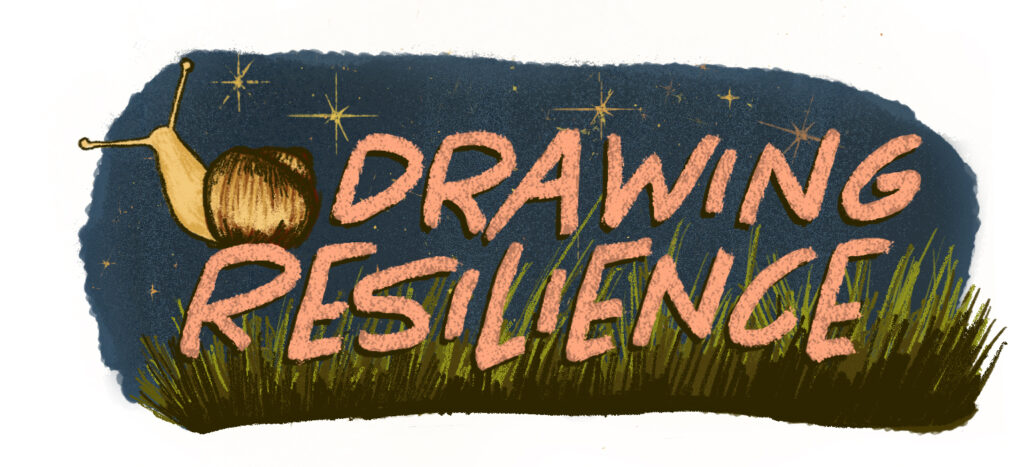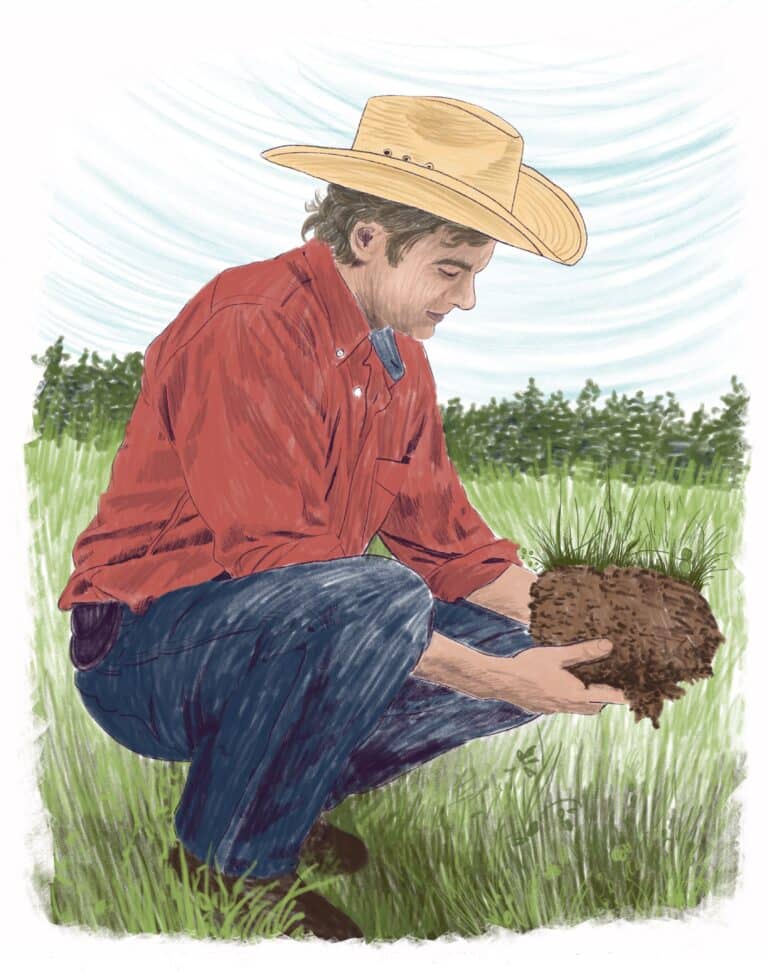
Drawing Resilience: Dorn Cox

Illustrations and interview by Nhatt Nichols
Dorn Cox is the research director for the Wolfe’s Neck Center for Agriculture and the Environment in Freeport, Maine, and farms with his family on 250 acres in Lee, New Hampshire. He is a founder of the farmOS software platform and Farm Hack, and is active in the soil health movement. His book, The Great Regeneration, is available from Chelsea Green Publishing.
Nhatt: Is there a way that we can build resilience around food systems?
Dorn Cox: The challenge is redefining what agriculture is beyond commercial enterprise and into something that can happen anywhere. That agriculture or land stewardship isn’t just done by farmers and ranchers; it’s something that we all do together. You have chefs, and then you have people who are home cooks, but everybody has a relationship with processing food in some way.
Nhatt: We all have to eat, and we all live in a place.
Dorn Cox: Right. Stewarding the environment isn’t just growing food, but the way in which agriculture is managing biodiversity, water quality, and climate. That’s part of the transition in how we support not just small-scale producers, but all scales of land stewardship. Getting more people engaged creates better outcomes. Some of that is creating diverse, more resilient local food systems that allow for decommodification of the products being produced.
Nhatt: What would that look like within a community?
Dorn Cox: If producers in a regional supply chain are getting (USDA Climate Smart Ag) payments for increasing biodiversity, pollinator and bird habitat, and riparian buffers, that can affect what they produce for their communities. The diverse products that come out of that model will look different than if you’re trying to sell a commodity.
Nhatt: This is part of the the hope that the USDA is going to continue to invest in diverse agricultural practices and not just in commercial commodieties like corn.
Dorn Cox: You can grow corn; in our case we’re growing Flint corn that’s roasted and ground into cornmeal. It’s sold in retail bags through local supply chain distribution, and also directly to restaurants who make into polenta or masa for tortillas. It’s direct; it’s a few miles between where the corn field is, and where it’s processed and turned into food. But that corn is part of a larger rotation that’s also producing hay, forage, pollinators, and other diverse crops, and the farmers are receiving a higher value for the finished product.
Nhatt: I love that there is an economic advantage to doing what’s best for the environment.
Dorn Cox: I made the case in The Great Regeneration (Chelsea Green, 2023) that the open source tools and technology that gave efficiency to Silicon Valley startups are now accessible to smaller scale supply chain networks; you get the same kind of efficiency without all that overhead and technical development. With our local food distribution network, the logistics software that can work with a half dozen farms working together.
Nhatt: This open source tech is taking the collective knowledge of the many and distributing it to the people who need it, putting humans first instead of corporations first.
Dorn Cox: That’s the vision. We know it’s possible because the backbone of the corporate expanse is actually public infrastructure.
Nhatt: Better soil practices are pretty labor intensive. Farms where I live don’t have the staff because they can’t find housing for them. Are there challenges in your community that get in the way of farmers doing the right thing?
Dorn Cox: Oh, absolutely. Land stewardship needs more people engaged with the way their food is produced.
In our area housing is absolutely a limiting factor. Part of the way to deal with that is through reciprocity and engaging people in the community aspect of agriculture. Gleaning and harvesting, for example, a Pick-Your-Own operation which you can do when you have agriculture close to urban fringes. We do things like a 50/50, exchange for picking, take 50%, home, leave 50% for the farm to retail. I think there’s multiple ways in which agriculture and the food economy functions in gifts and reciprocity.
Nhatt: There’s value in creating a space where people can understand that local agriculture benefits more than just people who are interested in getting inexpensive food.
My only critique is that I’m fortunate that I’ve got time to volunteer, whereas a lot of people don’t.
Dorn Cox: That’s the other thing. Housing and time are real limit limiting factors that are structural.
Part of this is creating meaningful livelihoods related to improving our environment, and compensating more people engaging in those activities.
Nhatt: Figuring out ways to be valuable to each other and the environment is a part of community resilience. Do you find it overwhelming to look at big problems like housing and climate change?
Dorn Cox: Some of the challenges around zoning, water rights, and other big structural challenges seem intractable, then they suddenly become flexible and open for discussion and change. Even 10 years ago you couldn’t talk about soil health, and now it’s part of the national lexicon. Regenerative felt too far out there, and now the concern is less that we’re using the term and more than that it isn’t greenwashed.
So many things feel like they move very slowly, then very quickly. And that’s where the hope is; that it can happen just like it did for smoking or marriage equality. Social issues that seemed like they would never move, and then they moved very quickly.
Get this and other rural content in your inbox with the Rural Assembly newsletter.







